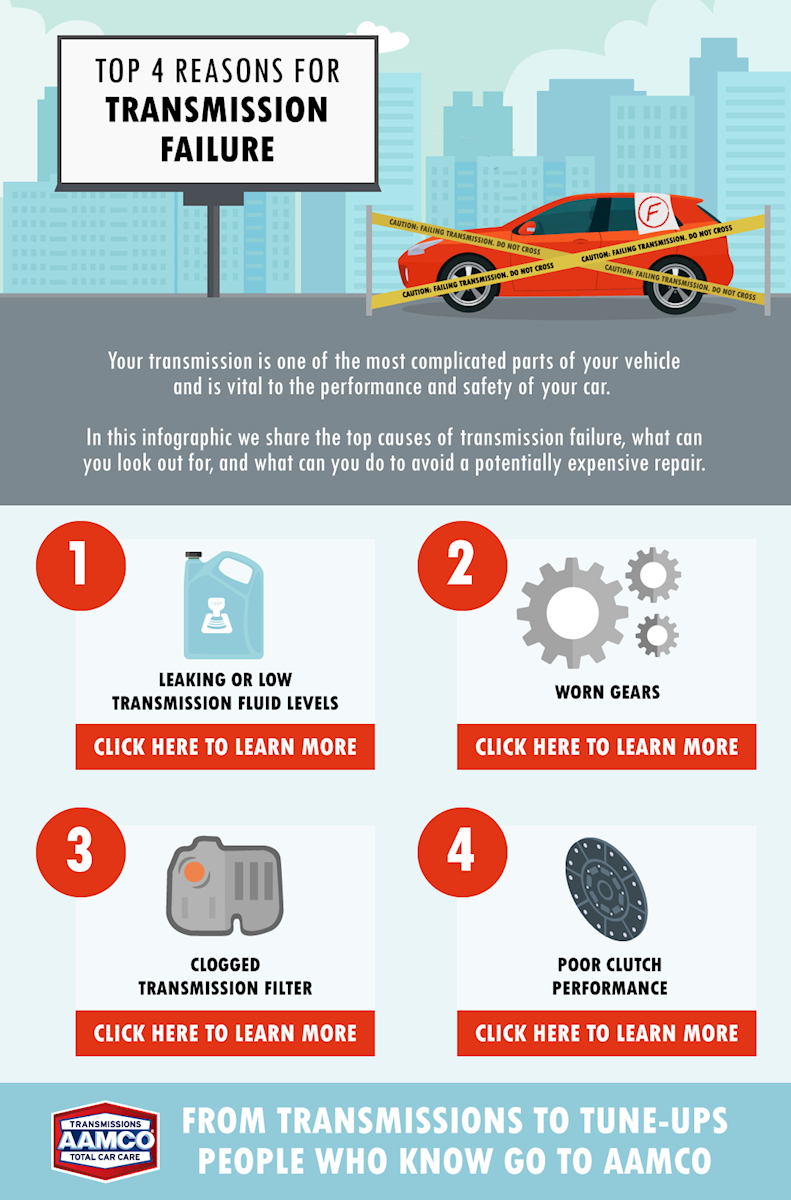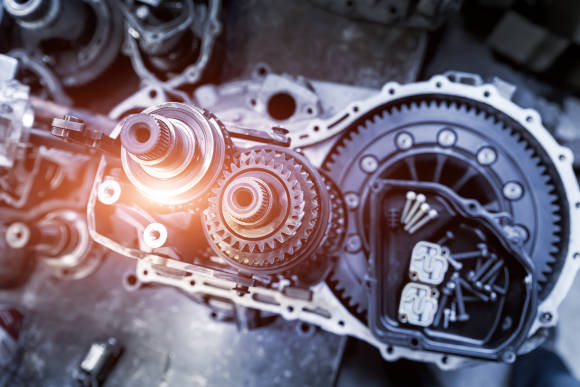What Would Cause Manual Transmission to Continually Fail

As a vehicle owner, there is nothing more frightening than when your car begins to shift harshly — or it fails to shift at all. Transmission failure is an automotive repair that can lead to massive repair bills, headaches on the road, and sometimes even having to purchase a new vehicle if not dealt with quickly and professionally.
The best way to avoid transmission failure is to know the signs when things begin to fail and take the steps necessary today to avoid a larger problem tomorrow. This article breaks down the top causes of transmission failure and how you can take the proper steps to help prevent them.

What Is a Transmission?
A transmission is a device that smoothly and efficiently transfers the engine's power to the wheels through a series of gear or ratio changes. There are many different types of transmissions. The most popular are manual, automatic, dual-clutch (DCT), continuously variable (CVT), and all the transmissions mentioned above coupled with AWD and 4WD transfer cases.
What Are the Main Symptoms of Transmission Failure?
Transmission failure can be broken down into three main categories: slipping, excessive noise, and complete failure.
1. Transmission Slipping
This means that the transmission is unable to engage with the engine properly. As a result, it will lose power and eventually stop working altogether. Transmission slipping is typically caused by computer control issues, lack of maintenance, and therefore wear and tear on the transmission.
2. Transmission Noise
Transmission noise can indicate damage to your transmission. Transmission noises such as grinding, whining, and whirling occur when the transmission's mechanical parts are no longer working correctly, have lost lubricant, have broken due to stress, and begin to "grind" together or against other parts of the transmission.
3. Transmission Failure
Transmission failure is the complete loss of transmission performance. Transmission failure can be caused by slipping, symptomatic noises, lack of fluid due to leaks, overheating, or outside factors that affect the transmission.
4 Causes of Transmission Failure
There are a variety of signs that your transmission may be failing. By knowing the tell-tale signs, you can take the necessary steps to damage that could lead to purchasing a new transmission or rebuilding your vehicle's transmission.
Transmission failure can be expensive and frustrating if the problem is not caught quickly. By preventing transmission problems early on with proper maintenance and measures, you can save yourself time and money down the road.
1. Leaking or Low Transmission Fluids
Transmission fluid is the lifeblood of the transmission. Transmission fluid lubricates all the moving parts within your transmission and provides the hydraulic properties to allow the transmission to work properly and smoothly.
Transmission fluid also helps bring heat away from the transmission to help avoid overheating. Any sign that the transmission fluid is low due to leaking should be taken seriously and repaired quickly. Low transmission fluid is the #1 reason for transmission failure and leads to major damage to the transmission if not caught quickly.
Proper fluid maintenance as prescribed by your manufacture's recommendation, using the correct fluid for your vehicle, paying attention to any leaks under your vehicle, and having the leak quickly repaired will ensure a reliable transmission for many miles.
2. Worn Gears
A primary sign that the gears or other parts inside the transmission are beginning to wear is when you start to feel a "clunk" each time your transmission shifts into gear or changes into another gear. Transmission noises can indicate the need for a costly repair or even a dangerous problem that could result in torque and power loss. It means that a part inside of your transmission is experiencing a problem.
The key to understanding "worn parts " is knowing there are many parts inside your transmission, including clutches, metal drums, pistons, springs, bearings, valves, and a planetary gear set (sometimes more than one). A planetary gear set works by having one set of gears rotate while another remains stationary, thus creating more ratios for the transmission to shift into and provide more "gears."
In a vehicle, an example of this is when the engine rotates while the transmission does not. Planetary gear sets are part of what allow automatic vehicles to utilize additional gears such as overdrive and reverse.
3. The Transmission Filter Is Clogged
A clogged transmission filter is another primary cause of transmission damage.
Transmission filters are designed to clean the transmission fluid as it passes through. A clogged or dirty transmission filter is a sign of major internal problems, which restricts the flow of transmission fluid, leading to the overheating of parts within your transmission. Transmission fluid with heavy clutch material or fine metal shavings indicates that internal parts are damaged, a problem that should be addressed immediately.
4. Poor Clutch Performance While Driving
A worn clutch in a manual transmission vehicle can quickly cause transmission failure.
A worn clutch means that there is no longer a proper connection between the engine and transmission. This stresses all parts within the transmission, which can lead to clutch and engine overheating, slipping, or grinding, and, if forcing shifts, transmission damage and failure.
Two "Overs" That Can Also Trigger Transmission Issues
1. Your Transmission Fluid Is Overheating
Transmission fluid that is dirty or burnt can be a sign of transmission failure.
Transmission fluid is designed to transfer heat away from the transmission to help avoid overheating. Still, if the transmission fluid itself becomes dirty or burnt, it will not be able to do its job properly, which puts your transmission at risk for overheating and eventual failure.
2. Your Transmission Is Overloading
Transmission failure can result from transmission overload when the transmission is forced to shift gears too rapidly. Transmission overload can be caused by sudden acceleration, driving up steep hills, or driving with a full vehicle when the load is much lighter than normal.
Transmission overload can be calculated by multiplying the vehicle's weight by 10, so if your car weighs 4,000 pounds and you are driving up a 20% grade hill, transmission overload occurs at 800 pounds. Knowing the weight of your vehicle can help you avoid transmission overload.

Tips for Better Transmission Care
The best way to prevent transmission problems is by taking the steps necessary to avoid them in the first place. Follow these tips to help ensure that you avoid transmission failure.
1. Maintain Proper Transmission Fluid Levels
This will keep the transmission running cool and reduce the risk of overheating, which can be a major cause of transmission failure. Transmission fluid levels should always be checked regularly and maintained. If your transmission fluid is low, this is an early indicator that you have a leak that needs to be repaired quickly.
The #1 cause of transmission failure is low fluid, which causes overheating. In automatic transmissions, it causes delayed engagement, harsh shifts, and slippage.
2. Don't Overload Your Vehicle
As stated above, overload can cause transmission failure. Make sure to check the weight and carrying load of your vehicle before you begin to drive. The last thing you want to face is transmission failure when you are in the middle of nowhere.
3. Schedule Transmission Maintenance Regularly
Regular transmission maintenance can ensure that your car is running smoothly and help prevent transmission failure. Transmission fluid should be changed regularly according to manufacturer recommendations, so if it isn't listed, speak with an expert at your local mechanic shop for more information on how often you should get your transmission fluid changed.
4. Use the Correct Transmission Fluid
Using the correct type and amount of transmission fluid will help ensure that the fluid can do its job properly, reducing the risk of overheating, lack of lubrication, transmission damage, and guaranteed failure. Your owner's manual will specify which type of transmission fluid your vehicle needs and how much it takes. Always use that specific fluid to ensure the proper functionality and durability of your transmission.
Avoid Transmission Failure with Routine Maintenance
Your transmission is an essential part of your vehicle. Transmission failure can be a huge inconvenience, so take the steps necessary to avoid transmission issues. The best way to ensure that your vehicle remains strong and healthy is by visiting AAMCO, your local transmission specialist, for regular transmission maintenance.
They will inspect your vehicle, provide the maintenance, and make any necessary repairs to prevent transmission failure from occurring. Transmission repair can be costly, so avoiding transmission maintenance mistakes is the easiest way to avoid empty pockets!
Source: https://www.aamcoblog.com/Article/The-Top-4-Reasons-for-Transmission-Failure#:~:text=Transmission%20failure%20can%20be%20caused,factors%20that%20affect%20the%20transmission.
0 Response to "What Would Cause Manual Transmission to Continually Fail"
Post a Comment